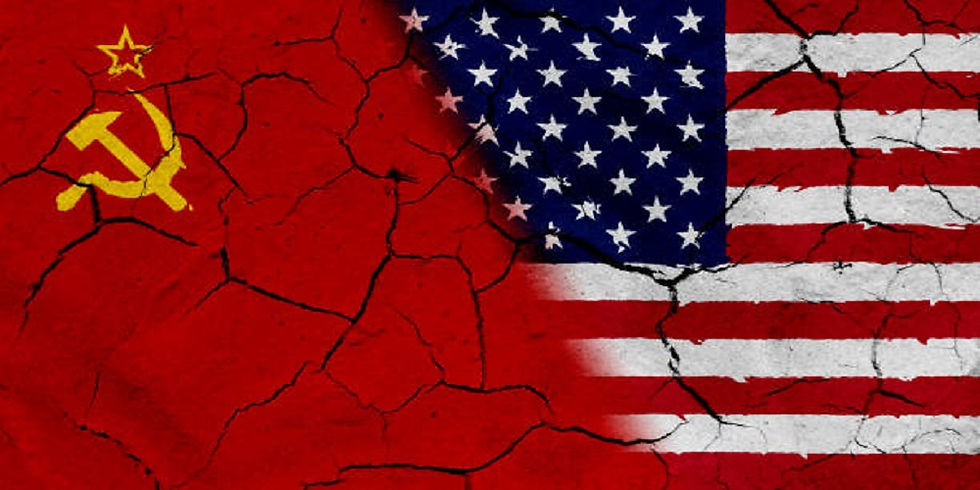The Cold War: Its End and Aftermath
- bookeygetbooks
- Jun 28, 2023
- 4 min read

The Cold War was a global conflict that lasted for almost five decades, from the end of World War II in 1945 to the collapse of the Soviet Union in 1991. The conflict was characterized by a political, economic, and military rivalry between the two superpowers of the time, the United States and the Soviet Union. This article will explore how the Cold War ended, its aftermath, the impact on international relations today, debates among historians regarding its origins, the relationship between the US and China during the Cold War, and the future of international relations.
1. How the Cold War ended and its aftermath
The Cold War ended in 1991 when the Soviet Union collapsed. The reasons for the collapse were complex and multifaceted, but many scholars believe that three factors were instrumental: the arms race, economic stagnation, and political repression. The arms race had drained the Soviet economy, and the country could not keep up with the military spending of the United States. Economic stagnation had set in due to corruption, inefficiency, and lack of innovation. Political repression had alienated the people of the Soviet Union, who demanded more political and human rights.
The end of the Cold War had significant consequences for the world. It marked the end of bipolarity, which had shaped the post-World War II order. The United States emerged as the dominant superpower, and many countries looked to it for leadership. The collapse of the Soviet Union also led to the emergence of new states in Eastern Europe and Central Asia. The peaceful resolution of the Cold War was a triumph of diplomacy and demonstrated that conflicts can be resolved without resorting to violence.
2. The impact of the Cold War on international relations today
The legacy of the Cold War is still felt in international relations today. One of the most significant impacts of the Cold War was the development of alliances and regional organizations. NATO, the European Union, and ASEAN are examples of such organizations that were formed during the Cold War to counter the influence of the Soviet Union. These organizations continue to play a vital role in shaping international relations today.
The Cold War also had an impact on the global economy. The arms race led to significant military spending by both the United States and the Soviet Union. This spending had a trickle-down effect on the rest of the world, as countries sought to keep up with the two superpowers. Today, the global economy is still affected by the legacy of the Cold War, as military spending remains high in many countries.
Another impact of the Cold War was on the ideas and values that underpin international relations. The conflict was waged between two systems of government, democracy, and communism. The victory of democracy over communism can be seen as a triumph of liberal ideals, which continue to shape international relations today.
3. Debates among historians regarding the origins of the Cold War
There has been much debate among historians regarding the origins of the Cold War. Some scholars argue that the conflict was due to ideological differences between the United States and the Soviet Union. Others point to geopolitical factors, such as the Soviet Union's desire for security and the United States' desire for global dominance.
One of the most controversial issues in the debate is the question of who was responsible for starting the Cold War. Some scholars argue that the United States was to blame for its aggressive foreign policy, while others point to Soviet expansionism as the cause of the conflict. The truth may lie somewhere in between, and it is likely that both sides played a role in the start of the Cold War.
4. The relationship between the US and China during the Cold War
The relationship between the United States and China during the Cold War was complex and often strained. After the communist revolution in China in 1949, the United States saw China as a threat to its interests in Asia. The United States also provided support to Taiwan, which remained a separate entity from China.
In the 1970s, however, the relationship between the United States and China began to improve. President Richard Nixon visited China in 1972, and the two countries established diplomatic relations. This was a significant development in the Cold War, as it signaled a shift in the balance of power away from the Soviet Union.
5. The future of international relations and the potential for a new world order
The end of the Cold War marked a turning point in international relations. However, new challenges have emerged in the 21st century that require a different approach. Globalization has brought about new economic opportunities but has also led to increased competition and inequality. Climate change is a global challenge that requires cooperation and coordination among nations.
The potential for a new world order exists, but it will require leadership and vision from the world's major powers. China is emerging as a major player in international affairs, and its relationship with the United States will be crucial in shaping the future of international relations. The United States must also work with other nations
6. Recommendations
"The Secret History of the CIA" by Joseph Trento - A critical examination of the CIA's covert activities during the Cold War, including its involvement in coups and assassination attempts.
"The Bomb: A Life" by Gerard DeGroot - A cultural history of the atomic bomb, exploring its impact on popular culture and the broader Cold War narrative.
"The Collapse: The Accidental Opening of the Berlin Wall" by Mary Elise Sarotte - An account of the events leading up to the fall of the Berlin Wall in 1989, including the role played by East German citizens and Soviet officials.
7. Questions and Answers Related to the Cold War
What was the significance of the Soviet invasion of Afghanistan?
The Soviet invasion of Afghanistan in 1979 was a significant event in the Cold War, as it marked the beginning of a costly and unsuccessful military intervention that contributed to the decline of the Soviet Union.
What was the significance of the Korean War?
The Korean War was a significant event in the Cold War, as it marked the first major military conflict between the United States and the Soviet Union and their respective allies.
What was the significance of the Vietnam War?
The Vietnam War was a significant event in the Cold War, as it marked the first major military defeat for the United States and contributed to the growing anti-war movement and social unrest in the country.


















Comments